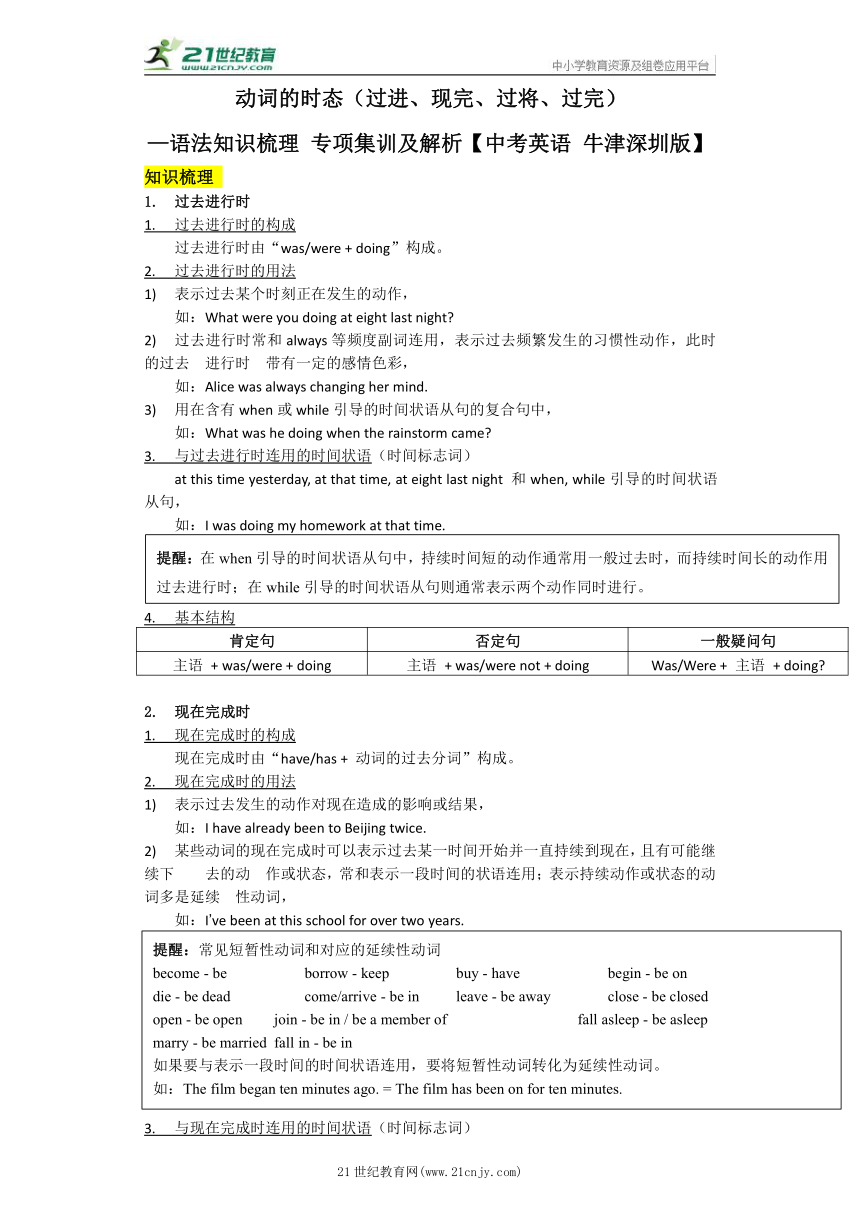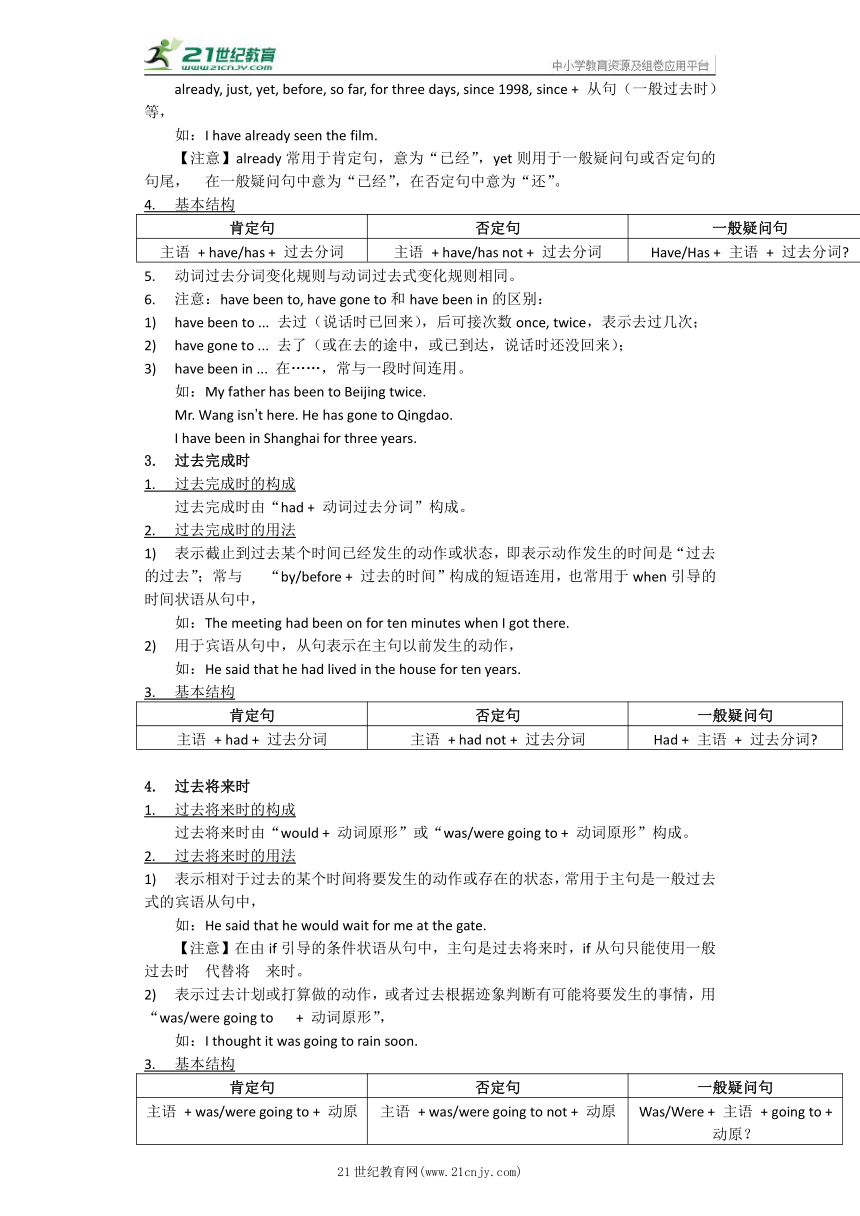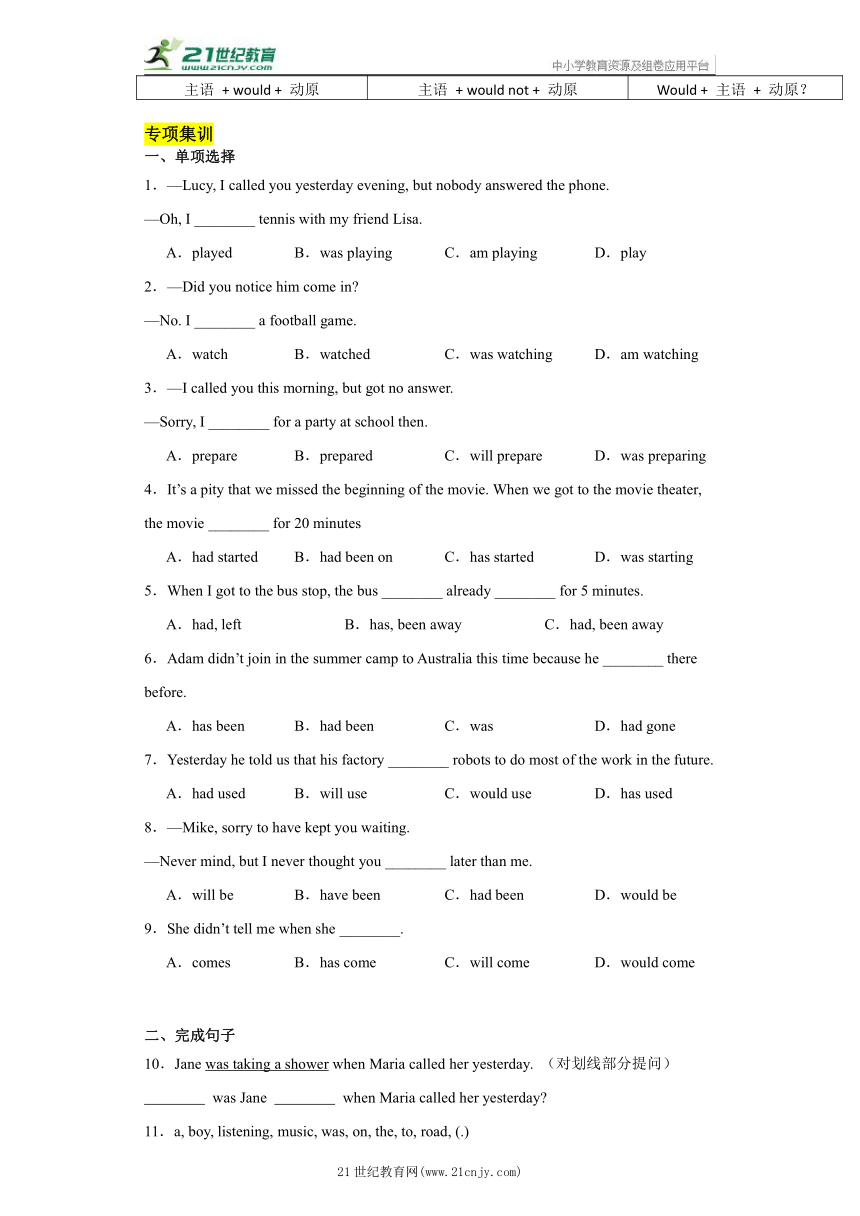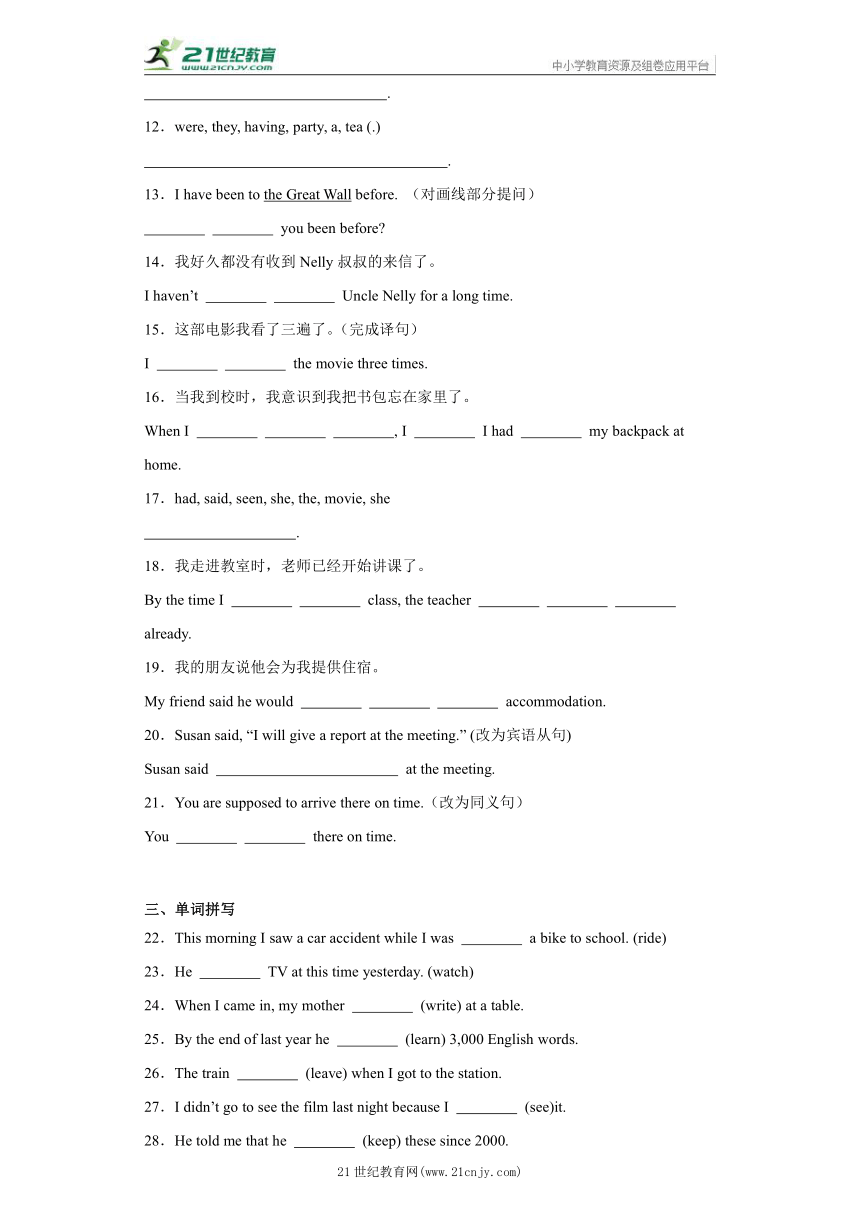动词的时态(过进、现完、过将、过完)—语法知识梳理+专项集训及解析【中考英语 牛津深圳版】
文档属性
| 名称 | 动词的时态(过进、现完、过将、过完)—语法知识梳理+专项集训及解析【中考英语 牛津深圳版】 |  | |
| 格式 | docx | ||
| 文件大小 | 45.7KB | ||
| 资源类型 | 试卷 | ||
| 版本资源 | 牛津深圳版 | ||
| 科目 | 英语 | ||
| 更新时间 | 2024-01-29 13:46:17 | ||
图片预览





文档简介
动词的时态(过进、现完、过将、过完)
—语法知识梳理 专项集训及解析【中考英语 牛津深圳版】
知识梳理
1. 过去进行时
1. 过去进行时的构成
过去进行时由“was/were + doing”构成。
2. 过去进行时的用法
1) 表示过去某个时刻正在发生的动作,
如:What were you doing at eight last night
2) 过去进行时常和always等频度副词连用,表示过去频繁发生的习惯性动作,此时的过去 进行时 带有一定的感彩,
如:Alice was always changing her mind.
3) 用在含有when或while引导的时间状语从句的复合句中,
如:What was he doing when the rainstorm came
3. 与过去进行时连用的时间状语(时间标志词)
at this time yesterday, at that time, at eight last night 和when, while引导的时间状语从句,
如:I was doing my homework at that time.
4. 基本结构
肯定句 否定句 一般疑问句
主语 + was/were + doing 主语 + was/were not + doing Was/Were + 主语 + doing
2. 现在完成时
1. 现在完成时的构成
现在完成时由“have/has + 动词的过去分词”构成。
2. 现在完成时的用法
1) 表示过去发生的动作对现在造成的影响或结果,
如:I have already been to Beijing twice.
2) 某些动词的现在完成时可以表示过去某一时间开始并一直持续到现在,且有可能继续下 去的动 作或状态,常和表示一段时间的状语连用;表示持续动作或状态的动词多是延续 性动词,
如:I’ve been at this school for over two years.
3. 与现在完成时连用的时间状语(时间标志词)
already, just, yet, before, so far, for three days, since 1998, since + 从句(一般过去时)等,
如:I have already seen the film.
【注意】already常用于肯定句,意为“已经”,yet则用于一般疑问句或否定句的句尾, 在一般疑问句中意为“已经”,在否定句中意为“还”。
4. 基本结构
肯定句 否定句 一般疑问句
主语 + have/has + 过去分词 主语 + have/has not + 过去分词 Have/Has + 主语 + 过去分词
5. 动词过去分词变化规则与动词过去式变化规则相同。
6. 注意:have been to, have gone to和have been in的区别:
1) have been to ... 去过(说话时已回来),后可接次数once, twice,表示去过几次;
2) have gone to ... 去了(或在去的途中,或已到达,说话时还没回来);
3) have been in ... 在……,常与一段时间连用。
如:My father has been to Beijing twice.
Mr. Wang isn’t here. He has gone to Qingdao.
I have been in Shanghai for three years.
3. 过去完成时
1. 过去完成时的构成
过去完成时由“had + 动词过去分词”构成。
2. 过去完成时的用法
1) 表示截止到过去某个时间已经发生的动作或状态,即表示动作发生的时间是“过去的过去”;常与 “by/before + 过去的时间”构成的短语连用,也常用于when引导的时间状语从句中,
如:The meeting had been on for ten minutes when I got there.
2) 用于宾语从句中,从句表示在主句以前发生的动作,
如:He said that he had lived in the house for ten years.
3. 基本结构
肯定句 否定句 一般疑问句
主语 + had + 过去分词 主语 + had not + 过去分词 Had + 主语 + 过去分词
4. 过去将来时
1. 过去将来时的构成
过去将来时由“would + 动词原形”或“was/were going to + 动词原形”构成。
2. 过去将来时的用法
1) 表示相对于过去的某个时间将要发生的动作或存在的状态,常用于主句是一般过去式的宾语从句中,
如:He said that he would wait for me at the gate.
【注意】在由if引导的条件状语从句中,主句是过去将来时,if从句只能使用一般过去时 代替将 来时。
2) 表示过去计划或打算做的动作,或者过去根据迹象判断有可能将要发生的事情,用“was/were going to + 动词原形”,
如:I thought it was going to rain soon.
3. 基本结构
肯定句 否定句 一般疑问句
主语 + was/were going to + 动原 主语 + was/were going to not + 动原 Was/Were + 主语 + going to + 动原?
主语 + would + 动原 主语 + would not + 动原 Would + 主语 + 动原?
专项集训
一、单项选择
1.—Lucy, I called you yesterday evening, but nobody answered the phone.
—Oh, I ________ tennis with my friend Lisa.
A.played B.was playing C.am playing D.play
2.—Did you notice him come in
—No. I ________ a football game.
A.watch B.watched C.was watching D.am watching
3.—I called you this morning, but got no answer.
—Sorry, I ________ for a party at school then.
A.prepare B.prepared C.will prepare D.was preparing
4.It’s a pity that we missed the beginning of the movie. When we got to the movie theater, the movie ________ for 20 minutes
A.had started B.had been on C.has started D.was starting
5.When I got to the bus stop, the bus ________ already ________ for 5 minutes.
A.had, left B.has, been away C.had, been away
6.Adam didn’t join in the summer camp to Australia this time because he ________ there before.
A.has been B.had been C.was D.had gone
7.Yesterday he told us that his factory ________ robots to do most of the work in the future.
A.had used B.will use C.would use D.has used
8.—Mike, sorry to have kept you waiting.
—Never mind, but I never thought you ________ later than me.
A.will be B.have been C.had been D.would be
9.She didn’t tell me when she ________.
A.comes B.has come C.will come D.would come
二、完成句子
10.Jane was taking a shower when Maria called her yesterday. (对划线部分提问)
was Jane when Maria called her yesterday
11.a, boy, listening, music, was, on, the, to, road, (.)
.
12.were, they, having, party, a, tea (.)
.
13.I have been to the Great Wall before. (对画线部分提问)
you been before
14.我好久都没有收到Nelly叔叔的来信了。
I haven’t Uncle Nelly for a long time.
15.这部电影我看了三遍了。(完成译句)
I the movie three times.
16.当我到校时,我意识到我把书包忘在家里了。
When I , I I had my backpack at home.
17.had, said, seen, she, the, movie, she
.
18.我走进教室时,老师已经开始讲课了。
By the time I class, the teacher already.
19.我的朋友说他会为我提供住宿。
My friend said he would accommodation.
20.Susan said, “I will give a report at the meeting.” (改为宾语从句)
Susan said at the meeting.
21.You are supposed to arrive there on time.(改为同义句)
You there on time.
三、单词拼写
22.This morning I saw a car accident while I was a bike to school. (ride)
23.He TV at this time yesterday. (watch)
24.When I came in, my mother (write) at a table.
25.By the end of last year he (learn) 3,000 English words.
26.The train (leave) when I got to the station.
27.I didn’t go to see the film last night because I (see)it.
28.He told me that he (keep) these since 2000.
29.He said that he (come) back in five minutes.
30.Mary told us she (arrive) on time the next day, but she was still late.
21世纪教育网(www.21cnjy.com)
21世纪教育网(www.21cnjy.com)
参考答案:
1.B
【详解】句意:——露西,我昨天晚上给你打电话,但是没有人接电话。——哦,我在和我的朋友丽莎打网球。
考查动词时态。根据“I called you yesterday evening”可知动作发生在过去,结合“tennis with my friend Lisa.”可知是指昨天晚上对方打电话的时候正和朋友打网球,因此答句谓语应用过去进行时。故选B。
2.C
【详解】句意:——你注意到他进来了吗?——不,我(当时)正在看足球比赛。
考查动词时态。watch看,动词原形;watched看,动词过去式;was watching正在看,过去进行时态;am watching正在看,现在进行时态。根据“Did”和“I...a football game.”可知,此处指那时候正在看球赛,应用过去进行时态。故选C。
3.D
【详解】句意:——我今天早上给你打电话,但没人接。——对不起,我当时正在为学校的一个聚会做准备。
考查动词时态。根据“I called you this morning”以及then可知,此处应用过去进行时表示过去某个时刻正在发生的事情,谓语结构是was/were doing。故选D。
4.B
【详解】句意:很遗憾我们错过了电影的开头。当我们到达电影院时电影已经开始二十分钟了。
考查过去完成时。根据“When we got to the movie theater, the movie”可知电影开始发生在过去的过去,所以用过去完成时态。过去完成时结构为:主语+had+动词的过去分词;根据“for 20 minutes”可知谓语动词用延续性动词;start对应的延续性状态为be on,be的过去分词为been,故选B。
5.C
【详解】句意:当我到达公共汽车站时,公共汽车已经开走了5分钟。
考查动词时态和延续性动词。leave离开,过去分词是left,短暂性动词;be away离开,延续性动词。根据“already”和“When I got to the bus stop”可知,应是在到车站前车就离开了,所以是强调过去的过去,所以用过去完成时,结合“for 5 minutes”是时间段可知,空处需用延续性动词。故选C。
6.B
【详解】句意:亚当这次没有参加去澳大利亚的夏令营,因为他以前去过那里。
考查过去完成时。由“Adam didn’t join in the summer camp to Australia this time because he … there before”可知,此处指亚当过去去过,过去的过去应用过去完成时,去过已回来用been。故选B。
7.C
【详解】句意:昨天他告诉我们将来他的工厂将使用机器人来做大部分工作。
考查过去将来时。根据“Yesterday he told us”可知,主句时态是一般过去时,从句时态与过去有关,且从句有“in the future”,因此从句用过去将来时,故选C。
8.D
【详解】句意:——迈克,抱歉让你久等了。 ——没关系,但我从没想过你会比我晚。
考查动词时态。由thought可知,主句是一般过去时,宾语从句表述将要发生的事情,要用过去将来时,其结构为would+动词原形。故选D。
9.D
【详解】句意:她没有告诉我她什么时候来。
考查时态。分析句子可知,when引导的是宾语从句,主句“She didn’t tell me”为一般过去时,从句要根据需要选择相应的过去时态,would come为过去将来时。故选D。
10. What doing
【详解】句意:昨天玛丽亚给简打电话时,她正在洗澡。就事件提问要用what“什么”,位于句首,首字母要大写,根据“was taking”可知,本句时态为过去进行时,动词应用现在分词形式doing。故填What;doing。
11.A boy was listening to music on the road
【详解】根据标点和单词提示可知,句子为陈述句;分析单词,a boy作主语,置于句首,首字母要大写;was listening to作谓语;music作宾语;on the road介词短语,作状语,置于句末。故填A boy was listening to music on the road“一个男孩在路上听音乐”。
12.They were having a tea party
【详解】根据所给标点可知,该句为陈述句;they作主语,were having是谓语,a tea party作宾语,故填They were having a tea party“他们正在举行茶话会”。
13. Where have
【详解】句意:我以前去过长城。画线部分“the Great Wall”是地点,要用where提问;原句是现在完成时,原句主语I变成疑问句时,要转换成you,助动词用have, 放在where后面,句首首字母大写。故填Where;have。
14. heard from
【详解】根据中英文对照可知,空格处为“收到……来信”,用“hear from”表示;结合“for a long time”和“haven’t”可知,此处应用现在完成时,haven’t后应接动词过去分词heard。故填heard;from。
15. have seen
【详解】根据“three times”以及中文意思可判断,此句用现在完成时have/has done的结构,主语I是第一人称,助动词用have,see“看”,故填have;seen。
16. got to school realized left
【详解】结合中英文,when引导的从句时态为过去时。第一二三空,get to school“到达学校”,get用过去式got;第四空,realized“意识到”,过去式;第五空leave“留下”动作发生在“到达”之前,用过去完成时的结构,had+动词过去分词,即had left。故填got;to;school;realized;left。
17.She said she had seen the movie
【详解】根据所给的词和标点可知,本题为陈述句,句型为含有宾语从句的复合句;主句是过去时态,She said为主句,从句为过去完成时态;she为从句的主语,had seen做从句的谓语,the movie做从句的宾语。故填She said she had seen the movie“她说她看过这部电影”。
18. walked/went into had started/begun teaching
【详解】分析题干可知,从句是一般过去时,由“by the time+一般过去时的句子”可知,主句是过去完成时,即had+过去分词。“走进”walk/go into,动词用过去式walked/went;“开始做某事”start/begin doing,动词用过去分词started/begun;“讲课”teach,用动名词teaching作宾语。故填walked/went;into;had;started/begun;teaching。
19. provide me with
【详解】provide sb with sth“为某人提供某物”,助动词would后接动词原形provide;动词provide后接人称代词的宾格me“我”作宾语。故填provide;me;with。
20.that she would give a report/she would give a report
【详解】句意:苏珊说:“我将在会上作报告。”陈述句改为宾语从句时要用that引导宾语从句,that可省略;主过从必过,从句用过去将来时,will改为would,Susan是女性,从句主语用she。故填that she would give a report/she would give a report。
21. should
arrive
【详解】句意:你应该按时到那里。“应该做某事”的表达方式有两种:be supposed to do sth.或者should do sth.,二者可以互换。故填should;arrive。
22.riding
【详解】句意:今天早上,当我骑自行车上学时,我看到了一场车祸。ride“骑”,was后应跟动词的现在分词构成过去进行时结构,故填riding。
23.was watching
【详解】句意:昨天的这个时候他正在看电视。由“at this time yesterday”可知,句子应用过去进行时,其结构为was/were+动词ing,He是主语,be动词用was。故填was watching。
24.was writing
【详解】句意:当我进来的时候,我妈妈正坐在桌旁写字。write“写”,动词。分析题干可知,此处表示在过去的某个时刻正在进行的动作,应用过去进行时,结构是was/were+动词-ing形式,主语my mother表示单数,所以be动词用was,动词write变成writing。故填was writing。
25.had learnt/had learned
【详解】句意: 到去年年底,他已经学了3000个英语单词。根据“By the end of the last year”可知, 谓语动作是在去年年底之前完成的,也就是发生在“过去的过去”,此句应该用过去完成时态,即had+过去分词,故填had learnt/learned。
26.had left
【详解】句意:当我到达车站的时候,火车已经走了。根据“got to”可知,从句中时态为一般过去时,“火车已经走了”发生在“我到达车站”之前,即“过去的过去”,用过去完成时“had done”,leave“离开”。故填had left。
27.had seen
【详解】句意:昨晚我没有去看这个电影,因为我已经看过它了。由“didn’t”可知,主句时态为过去时,“我看过这个电影”这个时间发生在“我昨晚没有去看这个电影”之前,即发生在过去的过去,应用过去完成时,结构为“had+done”,see“看”的过去分词形式是“seen”。故填had seen。
28.had kept
【详解】句意:他告诉我他从2000年起就一直保存着这些东西。that后是宾语从句,根据told以及“主过从必过”可知,从句用过去的某个时态,结合“since 2000”可知,从句用过去完成时had done的结构,故填had kept。
29.would come
【详解】句意:他说, 他五分钟后回来。句子是含宾语从句的复合句。主句主语是he,谓语是said,“that...minutes”是宾语从句。主句用的一般过去时,从句也要用与过去相关的时态。从句中有用于将来时的时间状语in five minutes“五分钟后”,所以从句要用过去将来时。过去将来时的结构是“主语+would+动词原形+其它”。故填would come。
30.would arrive
【详解】句意:玛丽告诉我们她第二天会准时到达,但她还是迟到了。分析句子可知,句中“Mary told us”后为宾语从句,主句为一般过去时,宾语从句用相应的过去时态,又根据从句时间状语“the next day”可知,从句应用过去将来时,其结构为“would+动词原形”,故填would arrive。
21世纪教育网(www.21cnjy.com)
21世纪教育网(www.21cnjy.com)
—语法知识梳理 专项集训及解析【中考英语 牛津深圳版】
知识梳理
1. 过去进行时
1. 过去进行时的构成
过去进行时由“was/were + doing”构成。
2. 过去进行时的用法
1) 表示过去某个时刻正在发生的动作,
如:What were you doing at eight last night
2) 过去进行时常和always等频度副词连用,表示过去频繁发生的习惯性动作,此时的过去 进行时 带有一定的感彩,
如:Alice was always changing her mind.
3) 用在含有when或while引导的时间状语从句的复合句中,
如:What was he doing when the rainstorm came
3. 与过去进行时连用的时间状语(时间标志词)
at this time yesterday, at that time, at eight last night 和when, while引导的时间状语从句,
如:I was doing my homework at that time.
4. 基本结构
肯定句 否定句 一般疑问句
主语 + was/were + doing 主语 + was/were not + doing Was/Were + 主语 + doing
2. 现在完成时
1. 现在完成时的构成
现在完成时由“have/has + 动词的过去分词”构成。
2. 现在完成时的用法
1) 表示过去发生的动作对现在造成的影响或结果,
如:I have already been to Beijing twice.
2) 某些动词的现在完成时可以表示过去某一时间开始并一直持续到现在,且有可能继续下 去的动 作或状态,常和表示一段时间的状语连用;表示持续动作或状态的动词多是延续 性动词,
如:I’ve been at this school for over two years.
3. 与现在完成时连用的时间状语(时间标志词)
already, just, yet, before, so far, for three days, since 1998, since + 从句(一般过去时)等,
如:I have already seen the film.
【注意】already常用于肯定句,意为“已经”,yet则用于一般疑问句或否定句的句尾, 在一般疑问句中意为“已经”,在否定句中意为“还”。
4. 基本结构
肯定句 否定句 一般疑问句
主语 + have/has + 过去分词 主语 + have/has not + 过去分词 Have/Has + 主语 + 过去分词
5. 动词过去分词变化规则与动词过去式变化规则相同。
6. 注意:have been to, have gone to和have been in的区别:
1) have been to ... 去过(说话时已回来),后可接次数once, twice,表示去过几次;
2) have gone to ... 去了(或在去的途中,或已到达,说话时还没回来);
3) have been in ... 在……,常与一段时间连用。
如:My father has been to Beijing twice.
Mr. Wang isn’t here. He has gone to Qingdao.
I have been in Shanghai for three years.
3. 过去完成时
1. 过去完成时的构成
过去完成时由“had + 动词过去分词”构成。
2. 过去完成时的用法
1) 表示截止到过去某个时间已经发生的动作或状态,即表示动作发生的时间是“过去的过去”;常与 “by/before + 过去的时间”构成的短语连用,也常用于when引导的时间状语从句中,
如:The meeting had been on for ten minutes when I got there.
2) 用于宾语从句中,从句表示在主句以前发生的动作,
如:He said that he had lived in the house for ten years.
3. 基本结构
肯定句 否定句 一般疑问句
主语 + had + 过去分词 主语 + had not + 过去分词 Had + 主语 + 过去分词
4. 过去将来时
1. 过去将来时的构成
过去将来时由“would + 动词原形”或“was/were going to + 动词原形”构成。
2. 过去将来时的用法
1) 表示相对于过去的某个时间将要发生的动作或存在的状态,常用于主句是一般过去式的宾语从句中,
如:He said that he would wait for me at the gate.
【注意】在由if引导的条件状语从句中,主句是过去将来时,if从句只能使用一般过去时 代替将 来时。
2) 表示过去计划或打算做的动作,或者过去根据迹象判断有可能将要发生的事情,用“was/were going to + 动词原形”,
如:I thought it was going to rain soon.
3. 基本结构
肯定句 否定句 一般疑问句
主语 + was/were going to + 动原 主语 + was/were going to not + 动原 Was/Were + 主语 + going to + 动原?
主语 + would + 动原 主语 + would not + 动原 Would + 主语 + 动原?
专项集训
一、单项选择
1.—Lucy, I called you yesterday evening, but nobody answered the phone.
—Oh, I ________ tennis with my friend Lisa.
A.played B.was playing C.am playing D.play
2.—Did you notice him come in
—No. I ________ a football game.
A.watch B.watched C.was watching D.am watching
3.—I called you this morning, but got no answer.
—Sorry, I ________ for a party at school then.
A.prepare B.prepared C.will prepare D.was preparing
4.It’s a pity that we missed the beginning of the movie. When we got to the movie theater, the movie ________ for 20 minutes
A.had started B.had been on C.has started D.was starting
5.When I got to the bus stop, the bus ________ already ________ for 5 minutes.
A.had, left B.has, been away C.had, been away
6.Adam didn’t join in the summer camp to Australia this time because he ________ there before.
A.has been B.had been C.was D.had gone
7.Yesterday he told us that his factory ________ robots to do most of the work in the future.
A.had used B.will use C.would use D.has used
8.—Mike, sorry to have kept you waiting.
—Never mind, but I never thought you ________ later than me.
A.will be B.have been C.had been D.would be
9.She didn’t tell me when she ________.
A.comes B.has come C.will come D.would come
二、完成句子
10.Jane was taking a shower when Maria called her yesterday. (对划线部分提问)
was Jane when Maria called her yesterday
11.a, boy, listening, music, was, on, the, to, road, (.)
.
12.were, they, having, party, a, tea (.)
.
13.I have been to the Great Wall before. (对画线部分提问)
you been before
14.我好久都没有收到Nelly叔叔的来信了。
I haven’t Uncle Nelly for a long time.
15.这部电影我看了三遍了。(完成译句)
I the movie three times.
16.当我到校时,我意识到我把书包忘在家里了。
When I , I I had my backpack at home.
17.had, said, seen, she, the, movie, she
.
18.我走进教室时,老师已经开始讲课了。
By the time I class, the teacher already.
19.我的朋友说他会为我提供住宿。
My friend said he would accommodation.
20.Susan said, “I will give a report at the meeting.” (改为宾语从句)
Susan said at the meeting.
21.You are supposed to arrive there on time.(改为同义句)
You there on time.
三、单词拼写
22.This morning I saw a car accident while I was a bike to school. (ride)
23.He TV at this time yesterday. (watch)
24.When I came in, my mother (write) at a table.
25.By the end of last year he (learn) 3,000 English words.
26.The train (leave) when I got to the station.
27.I didn’t go to see the film last night because I (see)it.
28.He told me that he (keep) these since 2000.
29.He said that he (come) back in five minutes.
30.Mary told us she (arrive) on time the next day, but she was still late.
21世纪教育网(www.21cnjy.com)
21世纪教育网(www.21cnjy.com)
参考答案:
1.B
【详解】句意:——露西,我昨天晚上给你打电话,但是没有人接电话。——哦,我在和我的朋友丽莎打网球。
考查动词时态。根据“I called you yesterday evening”可知动作发生在过去,结合“tennis with my friend Lisa.”可知是指昨天晚上对方打电话的时候正和朋友打网球,因此答句谓语应用过去进行时。故选B。
2.C
【详解】句意:——你注意到他进来了吗?——不,我(当时)正在看足球比赛。
考查动词时态。watch看,动词原形;watched看,动词过去式;was watching正在看,过去进行时态;am watching正在看,现在进行时态。根据“Did”和“I...a football game.”可知,此处指那时候正在看球赛,应用过去进行时态。故选C。
3.D
【详解】句意:——我今天早上给你打电话,但没人接。——对不起,我当时正在为学校的一个聚会做准备。
考查动词时态。根据“I called you this morning”以及then可知,此处应用过去进行时表示过去某个时刻正在发生的事情,谓语结构是was/were doing。故选D。
4.B
【详解】句意:很遗憾我们错过了电影的开头。当我们到达电影院时电影已经开始二十分钟了。
考查过去完成时。根据“When we got to the movie theater, the movie”可知电影开始发生在过去的过去,所以用过去完成时态。过去完成时结构为:主语+had+动词的过去分词;根据“for 20 minutes”可知谓语动词用延续性动词;start对应的延续性状态为be on,be的过去分词为been,故选B。
5.C
【详解】句意:当我到达公共汽车站时,公共汽车已经开走了5分钟。
考查动词时态和延续性动词。leave离开,过去分词是left,短暂性动词;be away离开,延续性动词。根据“already”和“When I got to the bus stop”可知,应是在到车站前车就离开了,所以是强调过去的过去,所以用过去完成时,结合“for 5 minutes”是时间段可知,空处需用延续性动词。故选C。
6.B
【详解】句意:亚当这次没有参加去澳大利亚的夏令营,因为他以前去过那里。
考查过去完成时。由“Adam didn’t join in the summer camp to Australia this time because he … there before”可知,此处指亚当过去去过,过去的过去应用过去完成时,去过已回来用been。故选B。
7.C
【详解】句意:昨天他告诉我们将来他的工厂将使用机器人来做大部分工作。
考查过去将来时。根据“Yesterday he told us”可知,主句时态是一般过去时,从句时态与过去有关,且从句有“in the future”,因此从句用过去将来时,故选C。
8.D
【详解】句意:——迈克,抱歉让你久等了。 ——没关系,但我从没想过你会比我晚。
考查动词时态。由thought可知,主句是一般过去时,宾语从句表述将要发生的事情,要用过去将来时,其结构为would+动词原形。故选D。
9.D
【详解】句意:她没有告诉我她什么时候来。
考查时态。分析句子可知,when引导的是宾语从句,主句“She didn’t tell me”为一般过去时,从句要根据需要选择相应的过去时态,would come为过去将来时。故选D。
10. What doing
【详解】句意:昨天玛丽亚给简打电话时,她正在洗澡。就事件提问要用what“什么”,位于句首,首字母要大写,根据“was taking”可知,本句时态为过去进行时,动词应用现在分词形式doing。故填What;doing。
11.A boy was listening to music on the road
【详解】根据标点和单词提示可知,句子为陈述句;分析单词,a boy作主语,置于句首,首字母要大写;was listening to作谓语;music作宾语;on the road介词短语,作状语,置于句末。故填A boy was listening to music on the road“一个男孩在路上听音乐”。
12.They were having a tea party
【详解】根据所给标点可知,该句为陈述句;they作主语,were having是谓语,a tea party作宾语,故填They were having a tea party“他们正在举行茶话会”。
13. Where have
【详解】句意:我以前去过长城。画线部分“the Great Wall”是地点,要用where提问;原句是现在完成时,原句主语I变成疑问句时,要转换成you,助动词用have, 放在where后面,句首首字母大写。故填Where;have。
14. heard from
【详解】根据中英文对照可知,空格处为“收到……来信”,用“hear from”表示;结合“for a long time”和“haven’t”可知,此处应用现在完成时,haven’t后应接动词过去分词heard。故填heard;from。
15. have seen
【详解】根据“three times”以及中文意思可判断,此句用现在完成时have/has done的结构,主语I是第一人称,助动词用have,see“看”,故填have;seen。
16. got to school realized left
【详解】结合中英文,when引导的从句时态为过去时。第一二三空,get to school“到达学校”,get用过去式got;第四空,realized“意识到”,过去式;第五空leave“留下”动作发生在“到达”之前,用过去完成时的结构,had+动词过去分词,即had left。故填got;to;school;realized;left。
17.She said she had seen the movie
【详解】根据所给的词和标点可知,本题为陈述句,句型为含有宾语从句的复合句;主句是过去时态,She said为主句,从句为过去完成时态;she为从句的主语,had seen做从句的谓语,the movie做从句的宾语。故填She said she had seen the movie“她说她看过这部电影”。
18. walked/went into had started/begun teaching
【详解】分析题干可知,从句是一般过去时,由“by the time+一般过去时的句子”可知,主句是过去完成时,即had+过去分词。“走进”walk/go into,动词用过去式walked/went;“开始做某事”start/begin doing,动词用过去分词started/begun;“讲课”teach,用动名词teaching作宾语。故填walked/went;into;had;started/begun;teaching。
19. provide me with
【详解】provide sb with sth“为某人提供某物”,助动词would后接动词原形provide;动词provide后接人称代词的宾格me“我”作宾语。故填provide;me;with。
20.that she would give a report/she would give a report
【详解】句意:苏珊说:“我将在会上作报告。”陈述句改为宾语从句时要用that引导宾语从句,that可省略;主过从必过,从句用过去将来时,will改为would,Susan是女性,从句主语用she。故填that she would give a report/she would give a report。
21. should
arrive
【详解】句意:你应该按时到那里。“应该做某事”的表达方式有两种:be supposed to do sth.或者should do sth.,二者可以互换。故填should;arrive。
22.riding
【详解】句意:今天早上,当我骑自行车上学时,我看到了一场车祸。ride“骑”,was后应跟动词的现在分词构成过去进行时结构,故填riding。
23.was watching
【详解】句意:昨天的这个时候他正在看电视。由“at this time yesterday”可知,句子应用过去进行时,其结构为was/were+动词ing,He是主语,be动词用was。故填was watching。
24.was writing
【详解】句意:当我进来的时候,我妈妈正坐在桌旁写字。write“写”,动词。分析题干可知,此处表示在过去的某个时刻正在进行的动作,应用过去进行时,结构是was/were+动词-ing形式,主语my mother表示单数,所以be动词用was,动词write变成writing。故填was writing。
25.had learnt/had learned
【详解】句意: 到去年年底,他已经学了3000个英语单词。根据“By the end of the last year”可知, 谓语动作是在去年年底之前完成的,也就是发生在“过去的过去”,此句应该用过去完成时态,即had+过去分词,故填had learnt/learned。
26.had left
【详解】句意:当我到达车站的时候,火车已经走了。根据“got to”可知,从句中时态为一般过去时,“火车已经走了”发生在“我到达车站”之前,即“过去的过去”,用过去完成时“had done”,leave“离开”。故填had left。
27.had seen
【详解】句意:昨晚我没有去看这个电影,因为我已经看过它了。由“didn’t”可知,主句时态为过去时,“我看过这个电影”这个时间发生在“我昨晚没有去看这个电影”之前,即发生在过去的过去,应用过去完成时,结构为“had+done”,see“看”的过去分词形式是“seen”。故填had seen。
28.had kept
【详解】句意:他告诉我他从2000年起就一直保存着这些东西。that后是宾语从句,根据told以及“主过从必过”可知,从句用过去的某个时态,结合“since 2000”可知,从句用过去完成时had done的结构,故填had kept。
29.would come
【详解】句意:他说, 他五分钟后回来。句子是含宾语从句的复合句。主句主语是he,谓语是said,“that...minutes”是宾语从句。主句用的一般过去时,从句也要用与过去相关的时态。从句中有用于将来时的时间状语in five minutes“五分钟后”,所以从句要用过去将来时。过去将来时的结构是“主语+would+动词原形+其它”。故填would come。
30.would arrive
【详解】句意:玛丽告诉我们她第二天会准时到达,但她还是迟到了。分析句子可知,句中“Mary told us”后为宾语从句,主句为一般过去时,宾语从句用相应的过去时态,又根据从句时间状语“the next day”可知,从句应用过去将来时,其结构为“would+动词原形”,故填would arrive。
21世纪教育网(www.21cnjy.com)
21世纪教育网(www.21cnjy.com)
同课章节目录
- 词法
- 名词
- 动词和动词短语
- 动词语态
- 动词时态
- 助动词和情态动词
- 非谓语动词
- 冠词
- 代词
- 数词和量词
- 形容词副词及其比较等级
- 介词和介词短语
- 连词和感叹词
- 构词法
- 相似、相近词比较
- 句法
- 陈述句
- 一般疑问句和否定疑问句
- 特殊疑问句及选择疑问句
- 反意疑问句
- 存在句(There be句型)
- 宾语从句
- 定语从句
- 状语从句
- 主谓一致问题
- 简单句
- 并列句
- 复合句
- 主谓一致
- 主、表语从句
- 名词性从句
- 直接引语和间接引语
- 虚拟语气
- 感叹句
- 强调句
- 倒装句
- 祈使句
- 句子的成分
- 句子的分类
- 题型专区
- 单项选择部分
- 易错题
- 完形填空
- 阅读理解
- 词汇练习
- 听说训练
- 句型转换
- 补全对话
- 短文改错
- 翻译
- 书面表达
- 任务型阅读
- 语法填空
- 其他资料
